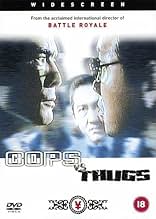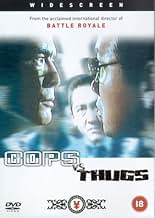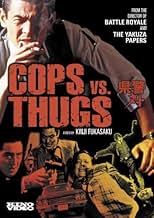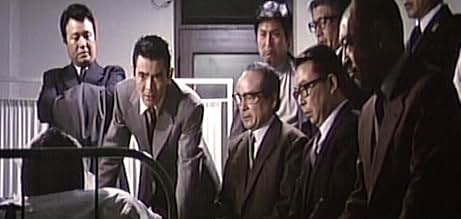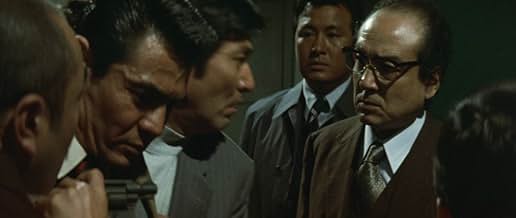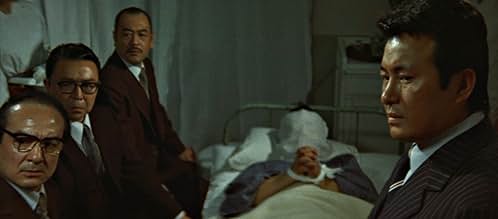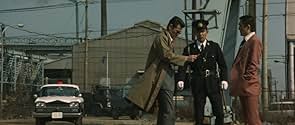IMDb RATING
7.2/10
1.1K
YOUR RATING
Acting boss Hirotani of the Ohara gang uses his friendship with corrupt cop Kuno to usurp a staged land deal that rival yakuza gang Kawade had arranged through local politicians. Open warfar... Read allActing boss Hirotani of the Ohara gang uses his friendship with corrupt cop Kuno to usurp a staged land deal that rival yakuza gang Kawade had arranged through local politicians. Open warfare erupts between the two gangs.Acting boss Hirotani of the Ohara gang uses his friendship with corrupt cop Kuno to usurp a staged land deal that rival yakuza gang Kawade had arranged through local politicians. Open warfare erupts between the two gangs.
- Awards
- 2 wins total
- Director
- Writer
- All cast & crew
- Production, box office & more at IMDbPro
Featured reviews
This probably deserves a second viewing because I lost the drift a couple of times and found myself confusing the goodies and the baddies. I'm sure this is partly the director's intention, but probably not to the extent I lost it for a while. Never mind this really moves along and the confusion surrounding the participants and the minimal plot matters little. Great cinematic style with much variety, even use of black and white for flash backs and freeze frame for emphasis. Rousing score inspired by blaxploitation movies and a welcome and strong performance from the great Reiko Ike. Sex and violence, some debate about whether the cops or the yakuza are the good guys and then some more sex and violence. Very good but I'm sure I'll enjoy it even more another time.
This film uses a kind of narrative sleight of hand. The audience is shown, in detail, the relationship between the police and one particular yakuza group, while the ties to the rival faction are left mostly in the shadows. If this were a detective novel, we would stop and ask: why is only one side described? But in the film, the insertion of the "friendly" yakuza bonded with the police makes us stop questioning. Then, after the climax, in the final scenes, we realize: we've been tricked.
In the history of yakuza cinema, the lineage is clear. First came Kurosawa's Drunken Angel (1948), where the police are powerless and the yakuza maintain the order of the streets in postwar chaos. Then came Fukasaku's Battles Without Honor and Humanity (1973), which showed how the once-impoverished police gradually grew in strength, until they stood toe-to-toe with the gangs, sliding into complicity and corruption. Viewers who know this trajectory are set up perfectly to fall into the trap here. Cops vs. Thugs depicts the very end of that era.
(Spoiler alert) The true mastermind behind the story is likely a yakuza group deeply tied to big construction firms. Unlike the small-time street thugs of old, these new organizations have swollen into economic powers, acting on a scale unimaginable in earlier yakuza history. The protagonists - both cops and gangsters - cannot see this shift clearly, and are swallowed by it. For years, they had managed a balance of collusion, compromise, and uneasy coexistence, but now everything slips through their fingers. Their bewilderment and frustration are written all over their faces. And in the end, the audience, too, is gutted along with them.
This is not just another gangster film; it is Fukasaku Kinji's summation of the yakuza genre - a work that cuts to the very fault lines of Japanese society.
In the history of yakuza cinema, the lineage is clear. First came Kurosawa's Drunken Angel (1948), where the police are powerless and the yakuza maintain the order of the streets in postwar chaos. Then came Fukasaku's Battles Without Honor and Humanity (1973), which showed how the once-impoverished police gradually grew in strength, until they stood toe-to-toe with the gangs, sliding into complicity and corruption. Viewers who know this trajectory are set up perfectly to fall into the trap here. Cops vs. Thugs depicts the very end of that era.
(Spoiler alert) The true mastermind behind the story is likely a yakuza group deeply tied to big construction firms. Unlike the small-time street thugs of old, these new organizations have swollen into economic powers, acting on a scale unimaginable in earlier yakuza history. The protagonists - both cops and gangsters - cannot see this shift clearly, and are swallowed by it. For years, they had managed a balance of collusion, compromise, and uneasy coexistence, but now everything slips through their fingers. Their bewilderment and frustration are written all over their faces. And in the end, the audience, too, is gutted along with them.
This is not just another gangster film; it is Fukasaku Kinji's summation of the yakuza genre - a work that cuts to the very fault lines of Japanese society.
The film is the Japanese answer to American mafia movies.
The director Kinji Fukasaku also knowed for his recent successfull movie "Battle Royale", began his carrer with Yakuza's movies being the most representative director of the genre and considered like the master of this kind of films, inspiring well-known authors like Kitano and Miike. In "cops vs thugs" he breaks the thin border between cop and thugs and mix them in a violent and corrupted world, being difficult to know who is the good or bad guy. Perhaps because everyone have two faces.
The actors play a good performance and the main character plays a superb role struggling between the law and common sense, he alone against the world like inspector Harry Callahan, but the humanity of the character consist in his doubts.
The plot of the movie isn't very original, landscape speculation, but for the movie don't have any importance. Also the music inspired in American movies of seventies give more dinamism to action scenes.
In conclusion a good movie highly recommended to genre fans, where no one is free of guilty, that can be summarize with a line from the script: "Gangsters and cops are the same. They both respect codes and laws."
8/10
The director Kinji Fukasaku also knowed for his recent successfull movie "Battle Royale", began his carrer with Yakuza's movies being the most representative director of the genre and considered like the master of this kind of films, inspiring well-known authors like Kitano and Miike. In "cops vs thugs" he breaks the thin border between cop and thugs and mix them in a violent and corrupted world, being difficult to know who is the good or bad guy. Perhaps because everyone have two faces.
The actors play a good performance and the main character plays a superb role struggling between the law and common sense, he alone against the world like inspector Harry Callahan, but the humanity of the character consist in his doubts.
The plot of the movie isn't very original, landscape speculation, but for the movie don't have any importance. Also the music inspired in American movies of seventies give more dinamism to action scenes.
In conclusion a good movie highly recommended to genre fans, where no one is free of guilty, that can be summarize with a line from the script: "Gangsters and cops are the same. They both respect codes and laws."
8/10
There's lots going on here in addition to the sex and violence that you'd expect. It's harsh, and deals with codes and honour in interesting ways. Think of it like a Japanese Scorcese picture and you'll get it. Works well.
Acting boss Hirotani (Hiroki Matsukata) of the Ohara gang uses his friendship with corrupt cop Kuno (Bunta Sugawara) to usurp a staged land deal that rival yakuza gang Kawade had arranged through local politicians. Open warfare erupts between the two gangs.
By 1975, Kinji Fukasaku had made more than 30 films, most if not all of this daunting number in the Toei studio system. Returning to the screen after completing their "Battles Without Honor and Humanity" series together, Fukasaku joined forces once again with screenwriter Kazuo Kasahara, composer Toshiaki Tsushima and star Bunta Sugawara.
We have a story where the corruption is so deep, it almost seems normal. It has been suggested that the title, "Cops Versus Thugs", is meant to imply "Cops as Compared to Thugs" rather than "Cops Fighting Thugs". This would be a wise and apt distinction, as the cops are every bit as involved in the yakuza as the "thugs" in this story. Allegedly the story is loosely based on a true incident (though no one knows what incident this would be), and there is the question of whether this is pure fantasy or some sort of blunt social commentary.
Besides the film's wild violence (sort of the precursor to Takashi Miike), what really stands out is the funky 1970s score from Toshiaki Tsushima, who worked with Fukasaku on the "Honor and Humanity" films as well as many others. One of their earlier collaborations is "The Green Slime" (1968), a personal favorite that was wrongly harangued in the debut episode of Mystery Science Theater 3000.
This is "Fukasaku at the peak of his powers," writes Tom Mes, who really ought to know better than anyone. For me, the peak will always be Fukasaku's final film, "Battle Royale", perhaps simply because it was my first exposure to his work. But of his nearly countless contributions to cinema, "Cops vs Thugs" (despite this terrible English title despite the subtlety mentioned above) is one of his best, and a true joy for anyone who likes crime, action, and maybe just a pinch of sleaze.
Along with a high-definition transfer, Arrow Video brings us "Beyond the Film: Cops vs Thugs", a new 10-minute video appreciation by Fukasaku biographer Sadao Yamane and a new 12-minute visual essay on cops and criminals in Fukasaku's works by film scholar Tom Mes. Praised by many as one of the all-time greatest yakuza films, this is not to be missed.
By 1975, Kinji Fukasaku had made more than 30 films, most if not all of this daunting number in the Toei studio system. Returning to the screen after completing their "Battles Without Honor and Humanity" series together, Fukasaku joined forces once again with screenwriter Kazuo Kasahara, composer Toshiaki Tsushima and star Bunta Sugawara.
We have a story where the corruption is so deep, it almost seems normal. It has been suggested that the title, "Cops Versus Thugs", is meant to imply "Cops as Compared to Thugs" rather than "Cops Fighting Thugs". This would be a wise and apt distinction, as the cops are every bit as involved in the yakuza as the "thugs" in this story. Allegedly the story is loosely based on a true incident (though no one knows what incident this would be), and there is the question of whether this is pure fantasy or some sort of blunt social commentary.
Besides the film's wild violence (sort of the precursor to Takashi Miike), what really stands out is the funky 1970s score from Toshiaki Tsushima, who worked with Fukasaku on the "Honor and Humanity" films as well as many others. One of their earlier collaborations is "The Green Slime" (1968), a personal favorite that was wrongly harangued in the debut episode of Mystery Science Theater 3000.
This is "Fukasaku at the peak of his powers," writes Tom Mes, who really ought to know better than anyone. For me, the peak will always be Fukasaku's final film, "Battle Royale", perhaps simply because it was my first exposure to his work. But of his nearly countless contributions to cinema, "Cops vs Thugs" (despite this terrible English title despite the subtlety mentioned above) is one of his best, and a true joy for anyone who likes crime, action, and maybe just a pinch of sleaze.
Along with a high-definition transfer, Arrow Video brings us "Beyond the Film: Cops vs Thugs", a new 10-minute video appreciation by Fukasaku biographer Sadao Yamane and a new 12-minute visual essay on cops and criminals in Fukasaku's works by film scholar Tom Mes. Praised by many as one of the all-time greatest yakuza films, this is not to be missed.
Did you know
- TriviaPresident of Toei Okada Yusuke came up with the title of the film while on the toilet.
- Crazy creditsOpening credits play over exposition explaining the current state of the yakuza within the city and their history.
- ConnectionsFeatured in Beyond the Film: Cops vs Thugs (2017)
Details
- Release date
- Country of origin
- Language
- Also known as
- Полицейские против бандитов
- Production company
- See more company credits at IMDbPro
- Runtime
- 1h 40m(100 min)
- Sound mix
- Aspect ratio
- 2.35 : 1
Contribute to this page
Suggest an edit or add missing content

